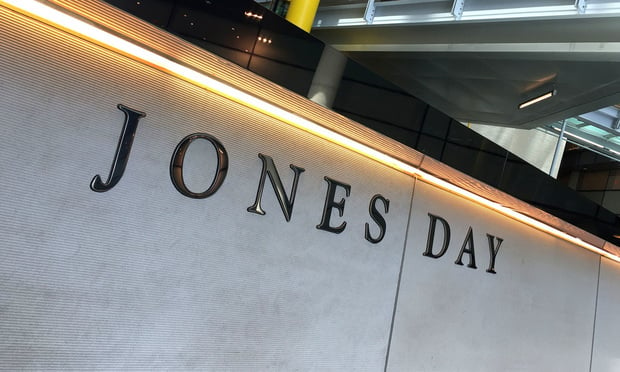Jones Day Argues Ex-Associates in Gender Bias Suit Should Be Denied Pseudonyms
The firm, representing itself, says a federal judge erred in letting four female former associates hide behind pseudonyms when they leveled accusations of widespread gender discrimination.
May 20, 2019 at 03:49 PM
5 minute read
The original version of this story was published on The American Lawyer
 Jones Day's offices in Washington, D.C. (Photo: Diego M. Radzinschi/ALM)
Jones Day's offices in Washington, D.C. (Photo: Diego M. Radzinschi/ALM)
Jones Day is once again relying on its own lawyers to fight accusations of systematic gender bias within the firm.
Just as it did in a 2018 lawsuit brought by former partner Wendy Moore, the firm is deploying its own talent to ward off a proposed class action suit by six female former associates who claimed in an April complaint that Jones Day's “black box” compensation model, leadership structure and culture serve to systematically deny women equal pay and opportunity for advancement.
The firm revealed its defense team in a filing in Washington, D.C., federal court on Monday that argued four women in the April suit should not be allowed to proceed pseudonymously.
“The Jane Does are not materially different from the countless employment discrimination plaintiffs who routinely file under their real names, including the named plaintiffs here who, rather than fearing publicity, have invited extensive media attention to themselves and their claims,” the firm said in a motion asserting the women misled the court in securing anonymity.
Jones Day has tapped two of its highest profile female attorneys—issues and appeals practice leader Beth Heifetz, Europe partner-in-charge Mary Ellen Powers, both of whom are based in Washington—to defend the lawsuit. Also on the team is New York-based employment partner Terri Chase.
The firm previously cited Heifetz as an example of its female friendly polices in a rebuttal to the lawsuit posted on its website, noting that she became the practice leader while working part-time after returning from a multiyear family leave.
The American Lawyer reported in June 2018 that Jones Day enlisted San Francisco of counsel Robert Mittelstaedt to defend against Wendy Moore's separate state court lawsuit against the firm. Jones Day has succeeded in placing that suit, filed in San Francisco state court, under seal, and current counsel information is unavailable to the public.
In both suits, plaintiffs are represented by Sanford Heisler Sharp.
In the most recent suit, former Irvine, California associates Nilab Rahyar Tolton and Andrea Mazingo put their name in the complaint. Four other women, two of whom also worked in California, secured permission from Chief Judge Beryl Howell of the U.S. District Court for the District of Columbia, to use pseudonyms
On Monday, the firm said this decision was made in error.
“For one thing, the court's approval of the pseudonyms itself impugns Jones Day's reputation by implying, without basis in evidence, that Jones Day would improperly retaliate against the Jane Does if their identities were made public,” the motion said. “For another, pseudonyms prevent the public—including clients, potential clients, lateral recruits, and law students—from fully evaluating the Does' allegations and credibility.”
Jones Day also said that the plaintiffs' public relations strategy surrounding the lawsuit made protecting the identify of the four plaintiffs particularly inappropriate. The firm noted that while it has yet to be served with the complaint, the plaintiffs gave it to the media before it was filed, and the two other plaintiffs have spoken to the press about their reasons for bringing the suit. This, according to Jones Day, is unfair to both the firm and the public, who can't assess the credibility of sources who are publicly attacking the firm without knowing their identify.
“Waging a public relations war is plainly a key part of plaintiffs' litigation strategy,” it said.
Jones Day also argued that the anonymity of its accusers is already hobbling its defense, noting that without knowing who the women are, it can't identify what witnesses within the firm to interview, nor do these witnesses know to come forward.
The firm sought to bolster its argument by referencing another high-profile gender bias suit brought by Sanford Heisler Sharp, in which six Jane Does have accused Morrison & Foerster of routinely holding back mothers and pregnant women. While that firm did not resist the plaintiffs' motion to file under pseudonyms, in a recent hearing, U.S. Magistrate Judge Jacqueline Scott Corley of the U.S. District Court for the Northern District of California suggested that the women suing the firm were not entitled to anonymity, as their career prospects were no more threatened by being part of a lawsuit than any other employment plaintiff.
Jones Day also noted that, at that same hearing, the judge questioned how any potential class member could make a decision about joining a class action suit without knowing the identify of the class representative, a point that does not fully transfer to the most recent lawsuit, where the identity of two class representatives is public.
The identify of the Morrison Foerster plaintiffs remains under wraps, thanks to the defense's lack of objections, but at the end of the hearing, the judge warned that they will at some point be forced to go public.
On Monday afternoon, Judge Randolph Moss of the U.S. District Court for the District of Columbia ordered the plaintiffs to respond to Jones Day's motion by Thursday. Attorneys from Sanford Heisler Sharp did not immediately respond to a request for comment Monday.
This content has been archived. It is available through our partners, LexisNexis® and Bloomberg Law.
To view this content, please continue to their sites.
Not a Lexis Subscriber?
Subscribe Now
Not a Bloomberg Law Subscriber?
Subscribe Now
NOT FOR REPRINT
© 2025 ALM Global, LLC, All Rights Reserved. Request academic re-use from www.copyright.com. All other uses, submit a request to [email protected]. For more information visit Asset & Logo Licensing.
You Might Like
View All
Firms Come Out of the Gate With High-Profile Litigation Hires in 2025

2024 Marked Growth On Top of Growth for Law Firm Litigation Practices. Is a Cooldown in the Offing for 2025?

Big Company Insiders See Technology-Related Disputes Teed Up for 2025

Litigation Leaders: Jason Leckerman of Ballard Spahr on Growing the Department by a Third Via Merger with Lane Powell
Trending Stories
- 1Crypto Crime Down, Hacks Up: Lawyers Warned of 2025 Security Shake-Up
- 2Atlanta Calling: National Law Firms Flock to a ‘Hotbed for Talented Lawyers’
- 3Privacy Suit Targets Education Department Over Disclosure of Student Financial Data to DOGE
- 4Colwell Law Group Founder Has Died in Skiing Accident
- 5Bar Report - Feb. 10
Who Got The Work
J. Brugh Lower of Gibbons has entered an appearance for industrial equipment supplier Devco Corporation in a pending trademark infringement lawsuit. The suit, accusing the defendant of selling knock-off Graco products, was filed Dec. 18 in New Jersey District Court by Rivkin Radler on behalf of Graco Inc. and Graco Minnesota. The case, assigned to U.S. District Judge Zahid N. Quraishi, is 3:24-cv-11294, Graco Inc. et al v. Devco Corporation.
Who Got The Work
Rebecca Maller-Stein and Kent A. Yalowitz of Arnold & Porter Kaye Scholer have entered their appearances for Hanaco Venture Capital and its executives, Lior Prosor and David Frankel, in a pending securities lawsuit. The action, filed on Dec. 24 in New York Southern District Court by Zell, Aron & Co. on behalf of Goldeneye Advisors, accuses the defendants of negligently and fraudulently managing the plaintiff's $1 million investment. The case, assigned to U.S. District Judge Vernon S. Broderick, is 1:24-cv-09918, Goldeneye Advisors, LLC v. Hanaco Venture Capital, Ltd. et al.
Who Got The Work
Attorneys from A&O Shearman has stepped in as defense counsel for Toronto-Dominion Bank and other defendants in a pending securities class action. The suit, filed Dec. 11 in New York Southern District Court by Bleichmar Fonti & Auld, accuses the defendants of concealing the bank's 'pervasive' deficiencies in regards to its compliance with the Bank Secrecy Act and the quality of its anti-money laundering controls. The case, assigned to U.S. District Judge Arun Subramanian, is 1:24-cv-09445, Gonzalez v. The Toronto-Dominion Bank et al.
Who Got The Work
Crown Castle International, a Pennsylvania company providing shared communications infrastructure, has turned to Luke D. Wolf of Gordon Rees Scully Mansukhani to fend off a pending breach-of-contract lawsuit. The court action, filed Nov. 25 in Michigan Eastern District Court by Hooper Hathaway PC on behalf of The Town Residences LLC, accuses Crown Castle of failing to transfer approximately $30,000 in utility payments from T-Mobile in breach of a roof-top lease and assignment agreement. The case, assigned to U.S. District Judge Susan K. Declercq, is 2:24-cv-13131, The Town Residences LLC v. T-Mobile US, Inc. et al.
Who Got The Work
Wilfred P. Coronato and Daniel M. Schwartz of McCarter & English have stepped in as defense counsel to Electrolux Home Products Inc. in a pending product liability lawsuit. The court action, filed Nov. 26 in New York Eastern District Court by Poulos Lopiccolo PC and Nagel Rice LLP on behalf of David Stern, alleges that the defendant's refrigerators’ drawers and shelving repeatedly break and fall apart within months after purchase. The case, assigned to U.S. District Judge Joan M. Azrack, is 2:24-cv-08204, Stern v. Electrolux Home Products, Inc.
Featured Firms
Law Offices of Gary Martin Hays & Associates, P.C.
(470) 294-1674
Law Offices of Mark E. Salomone
(857) 444-6468
Smith & Hassler
(713) 739-1250






